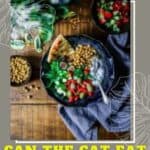
The domestic cat needs mainly proteins and is definitely carnivorous. To delight our cat, we can definitely opt for one of these solutions: dry food, wet food and small homemade meals. For the latter, however, it is worth considering what foods to offer them. So let’s see what are our foods that we can share with the cat?
There are many foods that we humans eat and that we can safely share with the cat. Now the number of people who want natural products for their cats is growing and they have no doubt about this.
That is why the simplest thing to do is to prepare food for your cat and it shows that you give so much love and attention to your cat and he will notice it. Proper nutrition is part of your cat’s well-being as you must know that cats are very greedy animals and this can only harm these cute furry ones.
The cat’s diet should consist mainly of protein, for their muscles, shiny coat and healthy skin. It also needs lipids (fatty acids) and carbohydrates but in limited quantities. Unlike the dog, it is much more delicate so the foods that we can share with the cat are not the same ones that you can share with Fido and therefore are not always right and healthy for our pet.
What you shouldn’t underestimate and never forget is that its food shouldn’t be overly seasoned and it should be raw. In fact, salt, sugar, pepper, vinegar and various other seasonings are bad for your cat’s health.
What are the foods we can share with the cat?

Meat
The cat’s ancestors were strictly carnivores and spent much of their time foraging for food. The domestic cat therefore has a physical predisposition to this type of diet: the jaw, the digestive system and the behavior are perfect for hunting. This is why its main food source is meat.
Its primary source of protein is of animal origin, so it is almost always possible to share meat with our cat, be it meat or poultry. Preferably it would be the case to share chicken, which seems to be one of the best meats we can offer our cats because it contains easily digestible proteins for the cat and is low in fat.
Fish
Among the most popular meals of the cat there is fish, and for us too, we can say that it is among our main courses that most delight us, so when we prepare a fish dish for us, let’s remember that our cat will gladly share. Usually the smell of freshly fried fish or the open can of tuna is enough to lure the cat into the kitchen in seconds, with one of its pounces.
Since fish alone does not meet the cat’s needs for minerals and trace elements, it is better to increase a certain amount of fish in the cat’s diet over time. In healthy animals, there is nothing wrong with serving a second serving in the feline bowl. Since fish has a low connective tissue content compared to meat, it is considered easy to digest and therefore suitable for cats with a sensitive digestive system.
If there are no obvious health problems, the cat can eat all kinds of fish. Trout, saithe, salmon, mackerel, tuna, sardine, herring, carp, cod, pike and perch are particularly suitable for homemade preparations. In general, saltwater fish are among the foods that we can share with the cat but freshwater fish would be preferred.
Egg
If our evening includes eggs, prepare them for two, your cat will have dinner with you. Occasionally an egg in his meals is just fine. However, you should only share hard-boiled eggs but not every day. For the cat, one egg a week is enough for the animal to benefit from the healthy ingredients.
Make sure the egg is cooked to eliminate the risk of Salmonella poisoning. You can also try scrambled eggs, but always make sure the egg cooks completely. Obviously, the egg will need to be completely cooled and cut into small pieces before placing it in your cat’s bowl.
Carbohydrates
The tolerance threshold of cats for the digestion of carbohydrates is significantly lower than in dogs, and it is completely irrelevant if the carbohydrates come from cereals such as rice, corn, potatoes, fruit or vegetables. As for the carbohydrates in whole foods, the digestive system of cats seems to have gotten used to it.
Fruits and vegetables
From time to time a certain amount of fruits and vegetables, cats can eat it. You have to give them very carefully and not try to experiment, because some fruits and vegetables for cats are very harmful, such as grapes, cabbage, turnips and bananas.
Cured meat
Cats, just like us humans, love this type of food, but you have to limit their consumption, both for you and for him, taking into account two things: they must not contain too much salt, pepper or too much fat. The most appropriate for the cat are ham and sliced turkey, if possible with a low salt content.
Gastronomy must be offered exceptionally, even if cats love it, you can give it to them for example as a reward. Salami, sausage, salted ham, etc. are strongly discouraged. In the end, and as a last resort, if you run out of food, you can share with him, a sausage.
Cheese (among the foods to share with the cat but with attention)
In addition to satisfying our palate, cheese offers a lot of energy and is beneficial for our health (with a moderate amount, of course). And anyone who lives with a cat knows that cheese is a food they usually like a lot. Since cheese is a high-protein food that also contains beneficial fats, it might be logical to conclude that cats can eat cheese.
But the matter is not that simple, because cheese is also a direct derivative of milk and most adult cats are lactose intolerant, because their body does not produce the enzyme necessary to digest milk or has insufficient levels to digest it properly. Therefore, when felines consume milk or dairy products, they can develop digestive problems, such as gas, vomiting or diarrhea.
Goat and sheep cheeses are easier for our cats to digest, but cow’s milk is cheaper and easier to find. It is therefore preferable to choose this type of cheese to avoid the digestive problems associated with their lactose intolerance, but you can also if desired, add low-fat cheeses such as ricotta.
Foods not to share with our feline
Below you will instead read a list of foods that are very pleasant for us but very harmful for our cats, so keep them in mind so as not to endanger the cat.
- alcohol: It goes without saying that cats should in no way consume alcohol in any form. This is why there are Bach flowers for cats in an alcohol-free version. Alcohol is toxic to cats and can cause severe liver and brain damage.
- Chocolate: Just like for dogs, chocolate is toxic to cats. It is very harmful, due to the theobromine it contains. This component is found in all types of chocolate, but in higher concentrations of dark chocolate and pure cocoa.
- Raw pork: By eating raw pork, cats are at risk of developing an Aujeszky virus infection , which is often fatal. Aujeczky’s disease, also known as ‘pseudo-rabies’, is mainly expressed by neurological disorders in cats.
- avocado: due to its very interesting nutritional characteristics, avocado is a trendy food. However, avocado is bad for cats. In addition to damaging the heart system of cats, it can cause the cat, breathing problems and edema.
- tomatoes and eggplant: these vegetables contain atropine, which is responsible for heart rhythm disturbances in cats.
- Raw Poultry Meat: While cats are big fans of poultry meat, they should by no means ever consume raw chicken.
- Raw chicken meat is a very dangerous food for cats: its ingestion could contain bacteria such as salmonella.
- Bones: Bone fragments could damage the cat’s palate, get stuck in the throat or even damage the intestinal walls.
- legumes and cabbage: these foods have the characteristic of being difficult to digest. For cats, these foods can be really hard to digest and cause gas bloating and diarrhea. There have also been some fatal cases in cats following the consumption of legumes or cabbage.
- Onions: Onions in all their forms are poisonous cat foods, whether raw, cooked, dried or powdered. The sulfur compounds contained in onions attack the red blood cells of cats.
- Milk: By nature, cats do not tolerate lactose. Therefore, they should not consume milk, but with moderation and attention it is possible to share some derivatives with our furry friend.






